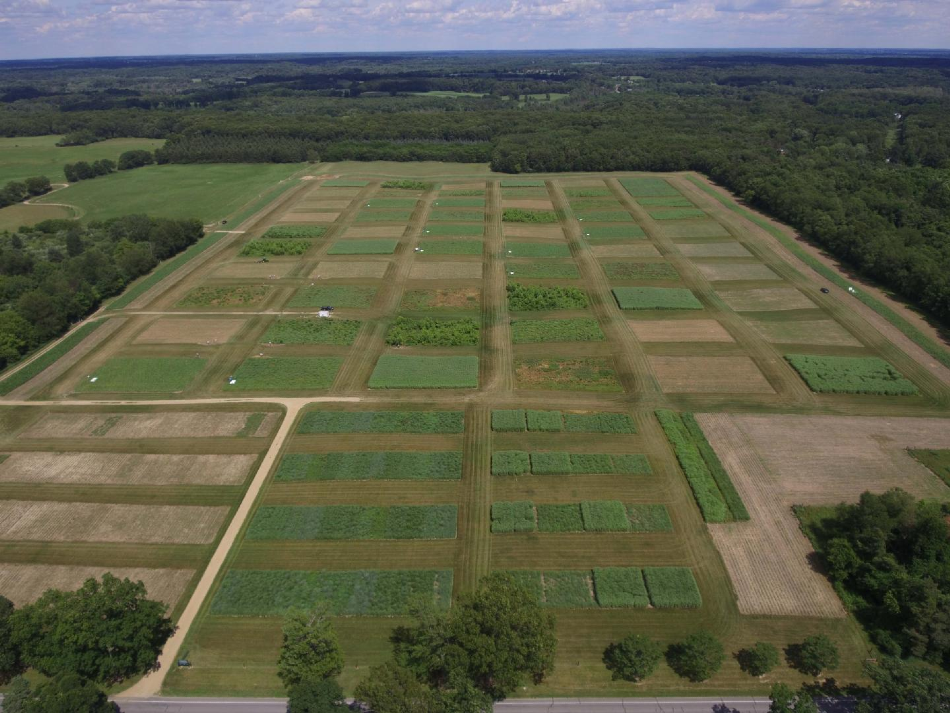Mar 11 2020
At Ben-Gurion University of the Negev (BGU) and Michigan State University (MSU), long-term field research carried out by scientists demonstrates that biomass fuels derived from several kinds of grass could considerably decrease global warming by reducing carbon.
 Photo of the Biofuels Cropping System Experiment in Michigan, taken by an unmanned aerial vehicle (UAV). Research conducted by Ben-Gurion University and Michigan State University. Image Credit: Ryan Mater.
Photo of the Biofuels Cropping System Experiment in Michigan, taken by an unmanned aerial vehicle (UAV). Research conducted by Ben-Gurion University and Michigan State University. Image Credit: Ryan Mater.
In the latest study, which was reported in the Environmental Science and Technology journal, the scientists analyzed several varieties of cellulosic biofuel crops to test their potential as a substitute for petroleum in ethanol fuel and electric light-duty vehicles such as small trucks and passenger cars.
Approaches for climate change mitigation that restrict the increase in global temperature to 1.5 °C depend on the decarbonization of vehicle fuel with a combination of carbon capture and storage (BECCS) and bioenergy production.
The technology of carbon capture and storage (CCS) can be used to capture up to 90% of the carbon dioxide (CO2) discharged as a result of industrial processes and electricity generation. This technology avoids an increase in the concentration of CO2 in the atmosphere.
The combined use of both renewable biomass and CCS is one of the few carbon abatement technologies leading to a “carbon-negative” mode, eliminating CO2 from the air.
This study performs the first-ever assessment of bioenergy feedstocks that are grown next to each other. The seven crops were poplar trees, giant miscanthus, maize residuals, restored native prairie, switchgrass, and a combination of grasses and vegetation that grows freely once the field is abandoned.
Every crop we tested had a very significant mitigation capacity despite being grown on very different soils and under natural climate variability. These crops could provide a very significant portion of the decarbonization of U.S. light-duty vehicle transport to curb CO2 emissions and slow global warming. Decarbonization of transportation is critical to limit rising temperatures.
Dr Ilya Gelfand, French Associates Institute for Agriculture and Biotechnology of Drylands, The Jacob Blaustein Institutes for Desert Research, Ben-Gurion University of the Negev
As part of the study, a comparison of petroleum-only emissions with the ethanol and bioenergy combination showed that the latter was 78% to 290% more efficient in decreasing carbon emissions. Biomass-powered electric vehicles were 74% to 303% cleaner, vehicles that run on ethanol were found to be 204% to 416% cleaner, and electric vehicles powered by a combination of biomass and CCS was 329% to 558% cleaner.
The research was carried out at the University of Wisconsin’s Arlington Research Station, which is part of the U.S. Department of Energy’s Great Lakes Bioenergy Research Center, and at MSU’s Kellogg Biological Station. Fascinatingly, the crops grown at MSU produced good yield compared to the ones grown at the more fertile Wisconsin site.
This is significant because it means that we’re likely to be able to produce these crops on marginal lands and still get high productivity. Long-term field experiments that include weather extremes such as drought, and actual rather than estimated greenhouse gas emissions, are crucial for stress-testing models assumptions.
Phil Robertson, Study Senior Author and Professor, Michigan State University
The further step in the study is the evaluation of other economic and environmental aspects of bioenergy crops. The finest biofuel crops are conservation-friendly, economically attractive to farmers, and do not release more pesticides or nitrogen to the environment.
The study was funded by the Office of Energy Efficiency and Renewable Energy (DE-AC05-76RL01830), the U.S. Department of Energy Office of Science (DE-FC02-07ER64494, DE-SC0018409), and the U.S. National Science Foundation LTER program (DEB 1832042), as well as Michigan State University AgBioResearch.